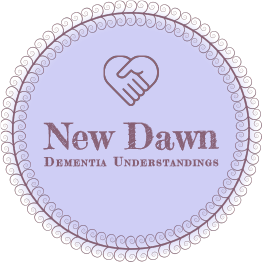Dementia may challenge a person’s cognitive capacity but it does NOT change our basic human needs.
There is a positive paradigm shift in Dementia care which has awakened us to the realization that what we have previously thought of as “negative behaviors related to Dementia”, are at root an outward expression of inner needs which are not being met. We’ve come to understand that these needs exceed our needs for food, clothing and shelter, and include needs of purposefulness, social acceptance, daily success, and security for the future. These are Human needs, not just the needs of those living with Dementia. We all have triggers in our everyday lives; we do not all have the cognitive capacity and filters to sort through the situation at hand and rationalize our way to wellbeing. When those not experiencing cognitive challenges are faced with an annoying situation or feelings of frustration, the capacity to reason and exercise forward thinking help to temper an impending reaction. As Dementia progresses it often dissipates our capacity to reason and think through a situation. The person is often left with a sense of frustration, hopelessness or anger. The reactions by those not cognitively impaired may differ from the outward reactions of those living with Dementia, but the human needs which trigger our reactions are the same. Are all of these needs being met?
If you are wondering how the needs of those without cognitive impairment are the same as those who may be challenged, please give some thought to some of your own feelings and emotions through this challenging year of 2020. Did social distancing protocols leave you feeling isolated? Bored? Sad? Lonely? Did you have feelings of being a “social failure” when you turned down that invitation to a group gathering? We all have a human need for social interactions with others and to feel socially accepted. Were you not able to complete a meal recipe or home improvement project due to unavailable items? Did you feel frustration when you were not able to successfully complete this task? We share the need to feel purposeful and successful in our daily lives. Did you experience fear of an unknown future as the virus continued to change our lives? We all want to feel secure about the future; especially those living with Dementia. How would you feel if you were not able to care for yourself and needed to depend on others for care? Would you feel embarrassed, or balk at the loss of your independence? If at times during this past year you have felt trapped in your own home, think of what it must be like to live in an environment with a keypad on the door. Our need to feel self-sufficient and exercise our freedom of choice are no different for those living with Dementia.
So much of what we have termed “negative behaviors” in those living with Dementia are expressions of human needs which are not realized or met. Is the “wanderer” getting enough physical and mental stimulation? Chances are they’re just plain bored and looking for something to do. Is the person who repeatedly refuses to participate in activities offered an activity which they (not the activity staff) think is a great idea? Have we asked them what they’d like to do today, or do we simply present them with a pre-programmed list of the day’s activities, smile brightly and try to convince them that they’ll totally enjoy this? Our fellow human beings who are living with Dementia and accompanying cognitive challenges still know what they want and don’t want. In short they know what makes them happy and fulfilled. We need to find the empathy to understand what their needs are and address those needs with person-centered care. We, without cognitive impairment, may have the capacity to temper and reason our way through situations, but the underlying needs are the same and will incline us towards frustration and negative emotions/”behaviors” when those needs are ignored or not met. We are all human beings with human needs. Dementia does not change that. If you’re perplexed by the reactions/responses of those living with cognitive impairment, ask yourself - How would I feel in this same situation? What would I want? Resist the urge to feel pity and sorrow…respect and dignity will go a lot further towards ensuring them an optimal life.
